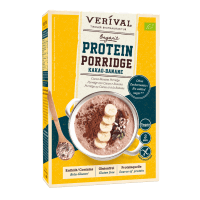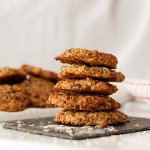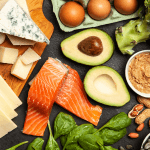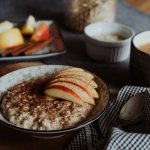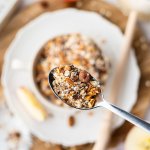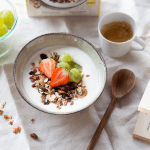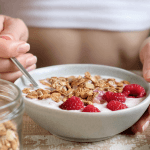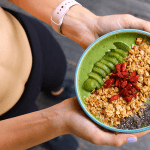What vitamins and minerals do I need as an athlete?
July 23, 2021- Fitness
- Gesund leben
- Healthy lifestyle
- Nutrition
- Sport

Vitamins and nutrients are important components of our food and a balanced diet is unthinkable without them! Unfortunately, we often forget how essential they are for a healthy mind and body and do not include enough foods with a high magnesium content, for example, in our diet. Yet this mineral has so many positive properties! Did you know, for example, that magnesium can reduce fatigue?
In this article, we want to give you an overview of the most important vitamins and minerals and present a way to cover ¼ of your nutritional needs with a healthy breakfast. We also asked ourselves what athletes in particular should consider when it comes to nutrition! Do certain minerals have an effect before sports or how can I prepare a vegan sports breakfast?
Find out more in this article!
Übersicht
What are vitamins?
First, let’s get to the bottom of what vitamins actually are. These food components are essential, i.e. they have to be taken in with food, as the body cannot produce them itself. A further distinction is made between water-soluble and fat-soluble vitamins. The difference lies in their storage capacity in the body.
Water-soluble vitamins must be taken regularly because they do not remain in the body for too long. An exciting fact: This is why water-soluble vitamins cannot lead to an overdose! The excess vitamins are simply excreted again.
Fat-soluble vitamins, on the other hand, can be stored in the body for longer if taken correctly.
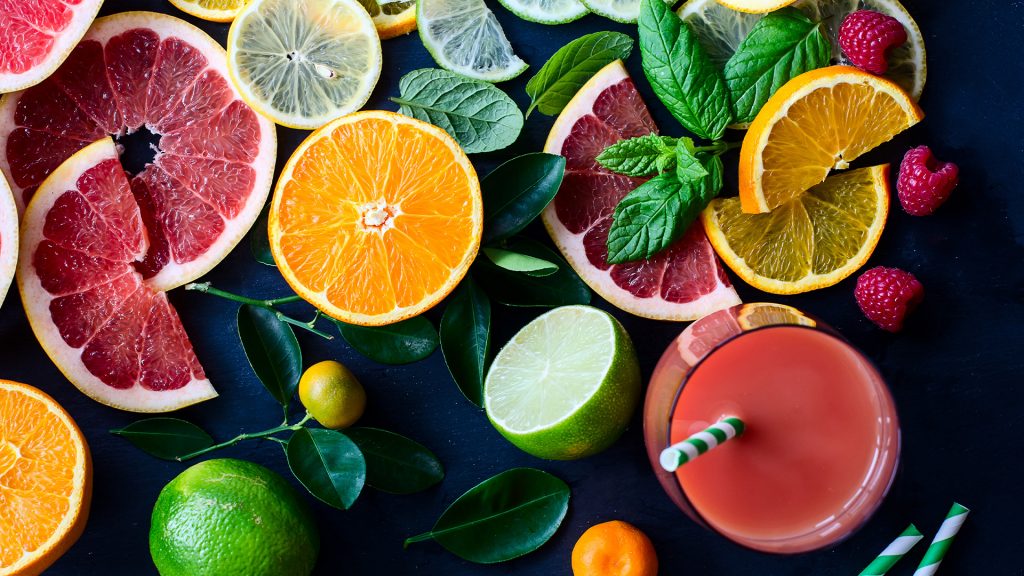
Vitamins & their functions
The following table will give you a rough overview of some vitamins and their functions.1
| Vitamins | Functions |
| Vitamin A | Fat-soluble, important for the skin and eyes, regulates cell growth and regeneration (wound healing) |
| Biotin (Vitamin B7) | Water-soluble, ensures ideal energy metabolism |
| Folat (Vitamin B9) | Water-soluble, supports the immune system, reduces fatigue |
| Vitamin B12 | Water-soluble, important for various metabolic processes |
| Vitamin C | Water-soluble, can improve the absorption of iron in the body, acts as an antioxidant against free radicals and thus against harmful substances |
| Vitamin D | Fat-soluble, regulates calcium levels |
| Vitamin E | Fat-soluble, acts as an antioxidant against free radicals and thus against harmful substances |
| Vitamin K | Fat-soluble, important for blood clotting |
Minerals – what are they?
Minerals, like vitamins, are also essential food components. A distinction is also made between bulk and trace elements. While bulk elements are present in the body with more than 50mg per kg body weight, trace elements – as the name suggests – are present with more than 50mg/kg.
The tasks of the minerals are manifold and vary depending on the mineral. The following table presents some important minerals and their functions.1
| Minerals | Functions |
| Calcium | Quantity element, important for the stability of the bones, ensures a functioning nervous and muscular system |
| Potassium | Bulk element, ensures optimal muscle function, has a positive effect on blood pressure, antagonist of sodium |
| Magnesium | Bulk element, important for bones, teeth, and muscles, reduces fatigue |
| Sodium | Bulk element, important for the electrolyte and water balance in the body, counterpart of potassium |
| Copper | Trace element, strengthens the immune system, supports the absorption of iron |
| Iron | Trace element, important for the immune system and blood formation, reduces fatigue |
| Zinc | Trace element, supports the immune system |
Why are vitamins & minerals important for your body?
Vitamins and minerals play an essential role in the body. You only notice how important they are when you suffer from a deficiency. Fatigue, a poor immune system or digestive problems are just a few of the possible consequences. Long-term malnutrition can also cause more serious damage.
Especially in view of the fact that vitamins and minerals cannot be produced in the body and, in addition, the water-soluble vitamins cannot be stored in the body or can only be stored to a small extent, it is important to make sure that you take them regularly!
Nevertheless, if you think you have a deficiency of a certain vitamin/mineral, you should not immediately take food supplements. It is always advisable to consult your doctor and, if necessary, have a complete blood count done.
The importance of vitamins & minerals for athletes
Athletes work with their bodies in a targeted way and stress them beyond the exercise they do in everyday life. In order to push the body as best as possible and bring it to the performance limit, attention should consequently also be paid to a balanced diet that covers all nutritional values!
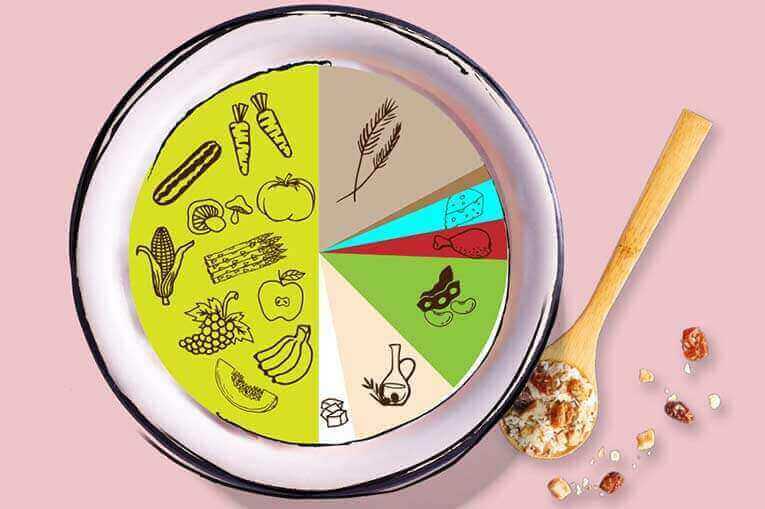
Since many vitamins and minerals, especially calcium, potassium and magnesium, contribute to functional muscles, you should keep an eye out for specific minerals.
What sports enthusiasts often also find interesting is whether vitamins can contribute to weight loss or whether there are vitamins for muscle building. Certain vitamins from the B group ensure a well-functioning metabolism and are therefore important for carbohydrate gain and loss.
Calcium, potassium and magnesium are particularly important for muscle building, as they play a role in the transmission of impulses and muscle contraction, thus ensuring functional muscles. But vitamins like B6 also help building muscle.2
Before you start, you should know your Body Mass Index (BMI), a ratio of height to weight that gives you a rough weight class. Especially if you are an athlete, you should pay attention to a few things. Therefore, it is best to test our BMI calculator that considers a few more things right away.
Do athletes have a higher vitamin and mineral requirement?
Basically, this question cannot be answered with a yes or no at first glance. Above all, individual factors are decisive in determining whether there is an increased need.
First of all, it depends on the type of physical activity, or more precisely, whether you sweat a lot. In addition to fluids, minerals are also excreted. Since some vitamins are important for energy metabolism, i.e. the conversion of certain substances into energy, an additional supply can also be important here.
An additional need for nutrients can usually be covered by a balanced diet. If you feel you have a deficiency, it is best to check with your doctor before supplementing.
Magnesium – why this mineral is important for athletes
As already briefly mentioned, the bulk element magnesium ensures sufficient energy during sports as a component in energy metabolism.
Does magnesium work against cramps?
Yes, because it acts as an antagonist to potassium and thus inhibits its release into the muscle. This prevents cramps from occurring.
Magnesium therefore plays a crucial role in healthy sports nutrition. However, you may legitimately ask yourself, should I take magnesium before or after exercise? Experts recommend taking the mineral a few hours before exercise. After all, the body already needs the substance during physical activity. Nevertheless, the goal should rather be a regular and constant intake through the diet.
Would you like to learn more about the versatile mineral, your individual needs and foods that contain particularly high amounts of magnesium? Then read our detailed article on magnesium.
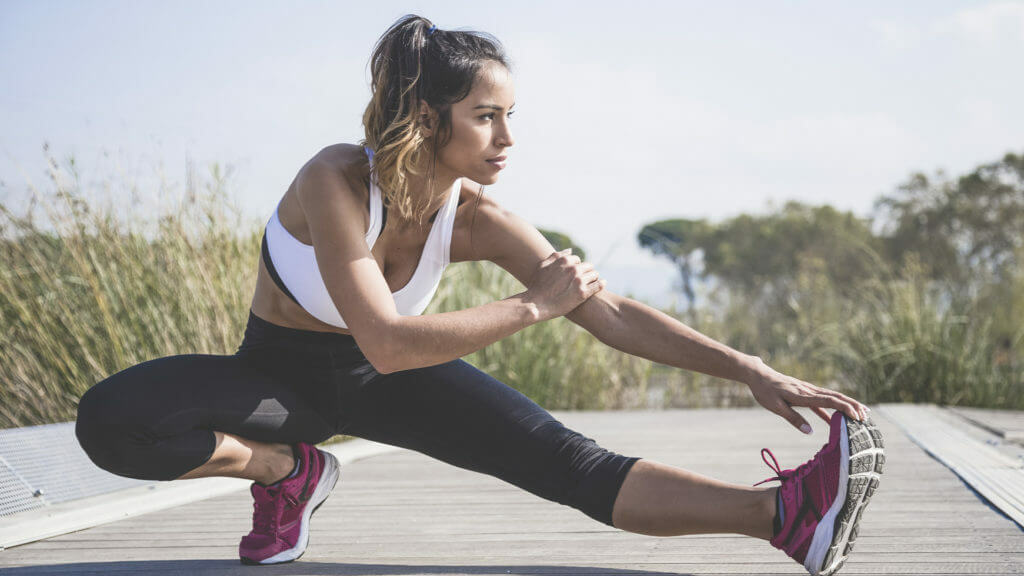
Sodium – The underestimated mineral
Sodium is probably known to most people in its combination with chloride as table salt. In addition, many have probably already heard that we should rather reduce the consumption of this quantity element. This is mainly due to the fact that we already consume enough sodium in our western diet through processed products.
But what functions does sodium have in the body? Together with chloride and potassium, it regulates the electrolyte and water balance of the body. This means that it is responsible for the absorption, excretion and distribution of electrolytes.
For athletes in particular, it is therefore important to take in enough sodium, as much is lost again through sweating.
Porridge – why it’s the perfect breakfast before exercise
Now that we’ve given you so much information about minerals and vitamins, we want to introduce you to a way that you can easily cover ¼ of your nutrients at breakfast. And the answer is: with porridge from Verival!
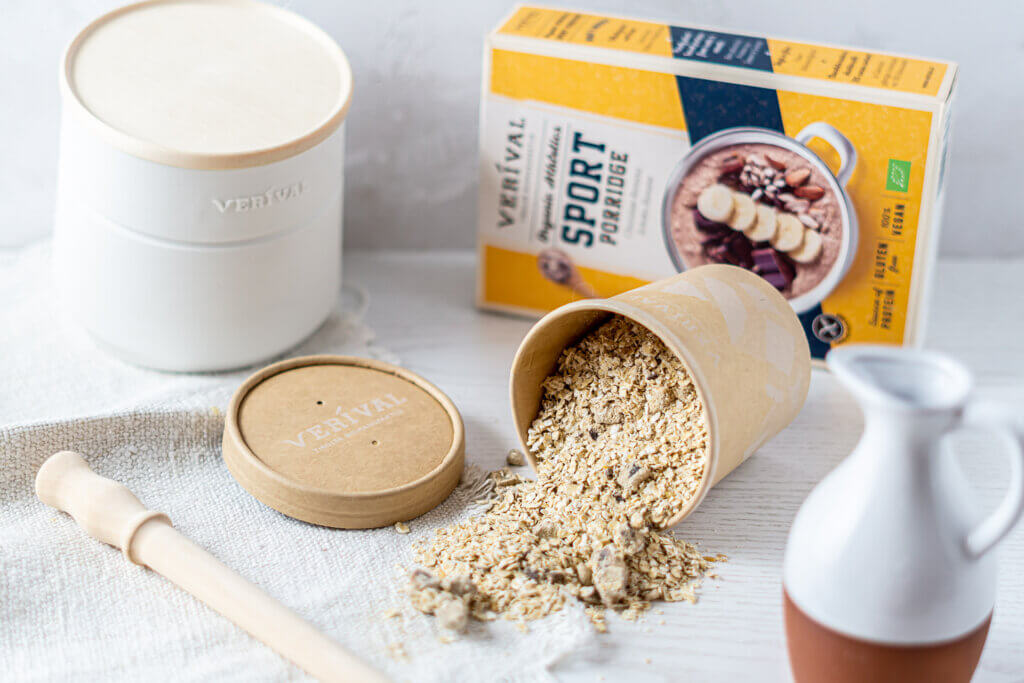
To back this up with concrete figures: One bowl contains a whopping 46% of your daily requirement of magnesium, 34% of iron, and 34% of vitamin B1. This way you can start the day healthy and get a large part of your nutrients at breakfast.
Our Sport Porridge Cocoa-Banana is particularly suitable, as it combines the benefits of a warm breakfast with those of a rich sports breakfast. The new porridge contains no additional sugar, without sacrificing a slight sweetness due to the bananas it contains. With the beneficial properties of cocoa and the high content of vegetable protein sources (15g per 100g), you will love this healthy breakfast!
The power of oatmeal
The advantages of oatmeal for breakfast should not be underestimated. Due to the excellent nutritional values and the high fibre content, this healthy breakfast keeps you full for a long time. To put it simply, the water-soluble dietary fibres begin to swell and dissolve in the body. This enlarges your stomach in a positive sense and you feel full.
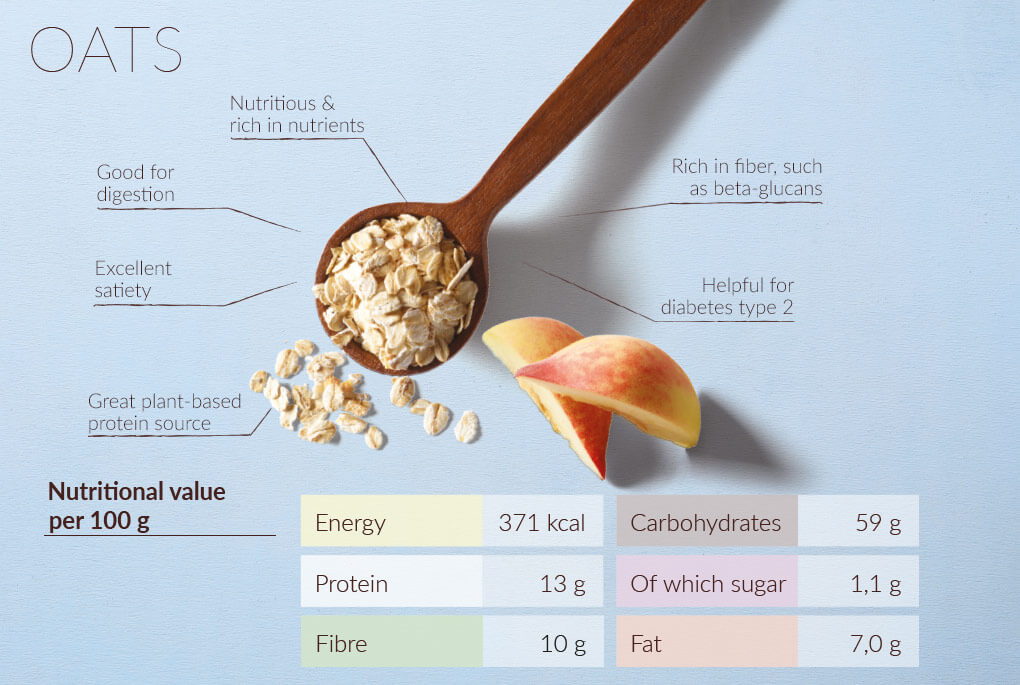
The body also takes longer to break down long-chain carbohydrates. As a result, the individual sugar particles are absorbed into the blood in smaller quantities and not as quickly, and the blood sugar level rises slowly. So you don’t just get a short high, but long-lasting energy during exercise!
- 1.O. V. Vitamine & Mineralstoffe. Gesundheit.gv.at. Published January 1, 2021. Accessed July 21, 2021. https://www.gesundheit.gv.at/leben/ernaehrung/info/vitamine-mineralstoffe/inhalt
- 2.O. V. 5 Mikronährstoffe, auf die Sportlerinnen und Sportler achten sollten. Lebensmittelverband Deutschland. Published April 6, 2018. Accessed July 21, 2021. https://www.lebensmittelverband.de/de/aktuell/20180406-internationaler-tag-des-sports-mikronaehrstoffe-nahrungsergaenzung-sportler-innen
- #frühstück vor dem sport
- #porridge gesund
- #Sport Range
- #zuckerfreier porridge

